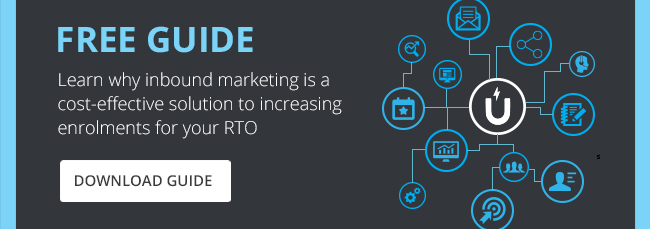
The enrolment cycle can take a lot of time, from the moment students and their parents start researching tuition options to the time when they complete the application process. The quicker you can convert prospective students, the faster your business will grow.
Inbound marketing helps speed up this process, positioning Registered Training Organisations (RTOs) as thought leaders in the educational sector. But in order to create the type of content that engages and delights prospective students, you need to focus on a few important aspects and avoid common closing mistakes.
Speed things up with defined personas
A ‘fully-fleshed’ persona profile goes a long way to ensuring that the content you create will attract a prospective student’s attention and speed up the enrolment cycle. The more you understand your personas’ preferences, interests and pain points, the better positioned you will be to provide the content your audience is looking for.
Speed things up with insight and empathy
Speak to your existing students to gain a deeper understanding of your prospective students’ goals and dreams. You will then be able to relate to them and understand their perspective on education and life in general. With this understanding, you’ll be able to change your value proposition and adapt your content to engage your prospective students.
Common mistakes when closing prospects
1. Failing to qualify leads
If you’re not qualifying leads properly, you’ll waste a lot of time following up and attempting to sell courses to students that aren’t really interested. To avoid this, you need to implement lead scoring and ensure this process is undertaken collaboratively between your sales and marketing departments. When qualifying your leads, you need to choose particular criteria, which you’ll score them against. Potential areas could be:
- Age: are they ready to undertake further study?
- Types of courses: are they interested in a particular field or just browsing generally?
- Have they studied before: are they interested in furthering their area of expertise?
- Are they the decision-maker: are you speaking to the parent or the student?
If they score low on the first category of age, you could put them on a drip campaign and send them information that might interest them over a period of time, until they are ready to do their post-school studying.
2. You aren’t optimising your top pages for lead generation
Not all your web pages generate the same amount of traffic and as such shouldn’t be treated the same. When looking at your site, you’ll probably find your home page and contact page is the most trafficked. As people are landing on these pages, it’s important to create opportunities for them to convert on these pages.
In order to optimise your top pages for leads, you need to create calls-to-action (CTAs) that stand out from the page, and they need to be placed where people naturally look. An eyetracking study has found this to be the upper left-hand corner of a website and then it moves on from there. Another way to generate leads is to place an offer or a quiz on a top page. For example, create a quiz on which courses a student should study based on their interests. Then promise to send them the results if they provide you with their details.
3. Your forms are too long or too short
Students are not going to spend ages filling in forms. But finding the right balance between too many form fields and too few can be tricky. A short form is attractive to many people and will increase your lead numbers, but you’ll get very little information from it, so ultimately you’ll convert fewer leads from it. This begs the question, what’s the right amount of questions to ask?
Think of every field on your form as an obstacle your student has to overcome and only include enough to ensure you can confidently capture enough information to assist with conversion.
4. You’re stumbling on social media
Social media is one of your most effective platforms to reach your students. According to MarketingSherpa, online adults in your students’ age groups (18-34) are most likely to follow a brand via social networking. If you build up a good brand profile on social media sites like Facebook and Twitter, it can lead to a good source of leads. You can link directly from your posts back to the relevant pages on your site. But it’s essential that your content is engaging, with the right level of information, or your audience will just scroll straight past it.
Inbound marketing – the way to speed up conversions for RTOs
Lupo Digital is an inbound marketing agency that specialises in helping Registered Training Organisations transform how they attract, engage and convert their students. We understand the challenges involved in finding leads, nurturing them and converting them, and help RTOs by creating online campaigns that drive more traffic and convert students at a faster rate.
For more information about how inbound working for RTOS, download our executive guide to inbound marketing for RTOs.

Written by Michael Wolf
Founder of Lupo Digital, Michael is extremely passionate about digital and inbound marketing. Michael helps organisations drive rapid and sustainable customer and revenue growth.
SUBSCRIBE TO OUR BLOG
SUBSCRIBE TO OUR BLOG
Popular
Categories
- Inbound Marketing (97)
- Digital Marketing Strategy (85)
- HubSpot (46)
- CRM (43)
- Artificial Intelligence (AI) (39)
- Content Marketing (35)
- Business Growth (27)
- Lead Management (27)
- Marketing Automation (26)
- Email Marketing (20)
- HubSpot Product Feature Updates (18)
- Customer Relationship Management (CRM) (16)
- Sales Enablement (14)
- Referral Marketing (12)
- content strategy (10)
- Social Media Marketing (8)
- Blogging (7)
- Buyer Personas (7)
- Goal Setting (7)
- Growth Driven Website Design (7)
- Buyer Journey (6)
- SEO (5)
- Paid Media (4)
- Conversational Marketing (2)
- Influencer Marketing (2)
- Sales & CRM HUG ANZ (2)
- Customer Experience (1)
- Data Management (1)
- HubSpot CRM (1)
- Legal practice management software (1)
- User Management (1)
- training (1)



